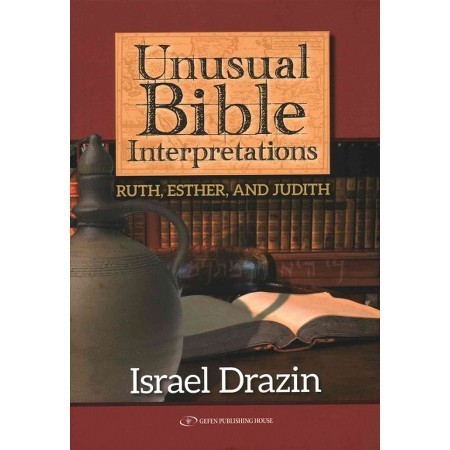The irony of the Purim shpiel
The base themes of the holiday of Purim are survival and the smile. Irony in my opinion is a smile with a clear understanding of the inner meaning of the biblical text, in this case that of the Book of Esther.
In a recently published book, “Unusual Bible Interpretations: Ruth, Esther, and Judith” (Gefen Publishing) by the renown scholar and musmach of Ner Yisrael, Rabbi Dr. Israel Drazin, we learn a lot of how irony serves at the backbone of the holiday’s meaning of Jewish physical survival.
These lessons of history come to make us better appreciate what our rabbis sought to teach us in terms of how humor and irony are brought together and thus can be thematically blended and endow us with a precious and more memorable observance of the festival of Purim.
Please note this sampling of a series of ironies as brought together by Rabbi Drazin:
“Esther is the only megillah read twice, once in the evening synagogue service of Purim and a second time during the morning services on Purim.
“It is the only megillah that is called ‘the Megillah,’ the only one that is universally read from a parchment scroll, the only one in which the synagogue reader recites a blessing before and after reading the scroll, and the only one for which many Jewish households purchased their own parchment scroll to use in following along silently during the synagogue reading.”
Here are some more ironies to ponder:
“Esther was not a heroine. She repeatedly expressed hesitation, from the moment that Mordecai requested that she speak to the king to save the Judeans from Haman’s decree to every encounter she later had with the king.
“Mordecai is the hero of Purim. It is he, not Esther, whom the book praises in its conclusion.
“Purim today is not celebrated as Mordecai asked the people to do, and as they agreed to do. The original holiday was observed for two days, on Adar 14–15. Later, for unknown reasons, it was changed to a single-day holiday observed on Adar 15 in walled cities such as Jerusalem and on Adar 14 elsewhere.
“Both Esther’s and Mordecai’s names, although considered Jewish names today, are Persian names most likely based on Ishtar and Marduk.
“Purim, too, is not a Hebrew word. The book had to define ‘pur’ as a lottery. Thus the holiday’s name is based on Haman’s superstitious notion that a lottery could reveal the auspicious day for exterminating Judeans.
“The primary practices of Purim include feasting, drinking alcohol and sending gifts. This reflects how the pagan Ahasuerus celebrated … there is nothing Jewish about this kind of celebration.
“The requirement to read the book of Esther during the holiday is not mentioned in the book and was instituted later.”
Now, consider still more ironies:
“The book of Esther contains many obscurities, and the first chapter is an excellent example of this: Why did Ahasuerus wait until the third year of his reign to start his celebration? What was he celebrating?
“If it requires wives to speak the language of their husbands, what is the relevance of this command to the story; why did the king command it?
“Why did Vashti have a separate party for women, given that history reveals that Persian men and women ate and drank together at banquets?”
This volume is indeed filled with loads of irony that prompts us to ask questions that, when given a closer look, prompt us even further to detect a certain comedic theme that is hidden just below the surface of impending disaster.
Purim is a fun holiday, yet the questions posed by these and the many other ironies cited in this learned work should surely lend an air a sobriety to the holiday’s historical themes and events.
Yes, even a smile can have a serious face to it.
FOR FURTHER STUDY
A recently published anthology of essays by Rabbi Aharon Lichtenstein, zt”l, entitled, “By His Light” edited by Rabbi Reuven Ziegler (Maggid Publishers), contains a scholarly essay dealing with Purim as first presented in 1984, entitled, “If You Remain Silent at This Time: Concern for the Jewish People.”
This serious essay goes deep into the relationship between Esther and Mordecai in how they attempted to strategize their efforts at preventing Haman’s plans of genocide of the Jewish people.
Rabbi Lichtenstein’s analysis of the events, especially the dialogues between them, are a lesson for our people’s leaders to read and emulate. Mordecai, in dealing with Esther’s hesitations uses as part of his argument with her two key phrases:
•“Do not imagine that you will escape in the king’s palace from all the Jews.”
•“For if you remain silent at this time, relief and deliverance will arise for the Jews elsewhere, but you and your father’s house will perish.”
These admonitions by Mordecai to Esther conclude with the following: “Who knows, perhaps for the sake of a time such as this you have come to join the royalty?”
This sober reflection with all its inherent political reality must serve as a severe admonition to all of our leaders today when they consider their actions on behalf of our people. Given current events they must do no less on our people’s behalf.

 46.0°,
Light Drizzle
46.0°,
Light Drizzle 




